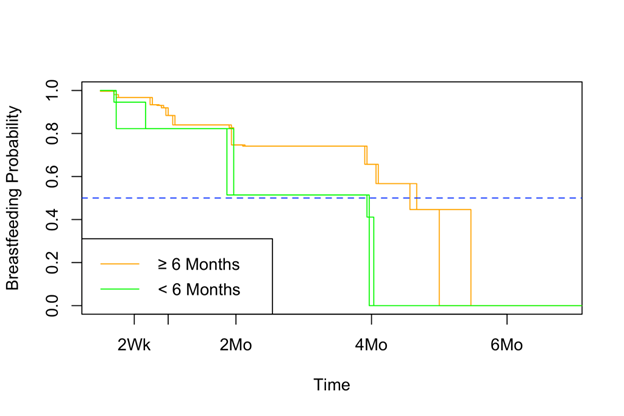Breastfeeding/Human Milk 3
Session: Breastfeeding/Human Milk 3
670 - Mothers’ Intentions to Breastfeed for 6 months Correlates with Breastfeeding Duration in a Diverse Population
Saturday, April 26, 2025
2:30pm - 4:45pm HST
Publication Number: 670.5941
Henry Bernstein, Cohen Children's Medical Center, New Hyde Park, NY, United States; Anusha Panjwani, Cohen Children's Medical Center, New Hyde Park, NY, United States; Sara C. Popofsky, Cohen Children's Medical Center/General Pediatrics, New Hyde Park, NY, United States; Angela Beatriz Cabrera, Cohen Children's Medical Center/General Pediatrics, New Hyde Park, NY, United States; Chang Yan, University of California, San Diego, La Jolla, CA, United States; Danielle T. Fisenne, Cohen Children's Medical Center, New Hyde Park, NY, United States; Cathie Spino, University of Michigan, Toledo, OH, United States

Henry Bernstein, DO, MHCM
Professor of Pediatrics
Cohen Children's Medical Center
Cohen Children's Medical Center
New Hyde Park, New York, United States
Presenting Author(s)
Background: Mothers’ Intentions to Breastfeed for 6 months Correlate with Breastfeeding Duration in a Diverse Population
Objective: To evaluate if maternal intention to breastfeed is a predictor of breastfeeding exclusivity and duration at 6 months.
Design/Methods: Breastfeeding mother-infant dyads were recruited, consented, and randomized for a longitudinal breastfeeding education study. Dyads were recruited at their first newborn visit, within 1 week of birth, at a general pediatrics clinic serving a diverse Queens/Long Island, NY population. Eligibility criteria included healthy, English or Spanish-speaking participants. At the newborn visit, mothers self-reported how many months they planned to breastfeed. Reasons for the intended duration were not collected. At newborn, 1-3 week, 1-month, 2-month, 4-month, and 6-month visits, mothers reported infant feeding. Cox models for interval-censored data and corresponding Kaplan Meier plots were used to examine the relationship between maternal intention to breastfeed (≥ 6 versus < 6 months) and actual duration of breastfeeding and breastfeeding exclusivity. Multivariable analyses controlled for potential confounders including race and ethnicity, education level, WIC status, and anticipated support for the baby.
Results: The population (n=313) was 36% Asian, 30% Black, 15% other, and 11% white; and 27% Hispanic or Latino. The median age of mothers was 31.6 years, 49% had less than a bachelor’s degree, and 34% were enrolled in WIC. Most mothers (91%) intended to breastfeed for at least 6 months. Median time to stopping breastfeeding was 4.5 months in mothers who intended to breastfeed for at least 6 months while mothers who intended to breastfeed less than 6 months stopped earlier (median 4 months) (Figure 1). Mothers who intended to breastfeed for < 6 months were more at risk to stop breastfeeding earlier by 177% compared with mothers who intended to breastfeed for at least 6 months (HR=2.77; 95% CI: 1.20, 6.40; p=0.02). There was no statistical difference in breastfeeding exclusivity between mothers who intended to breastfeed for at least 6 months and those who intended to breastfeed for < 6 months (HR=1.46; p=0.97).
Conclusion(s): Breastfeeding cessation among a diverse population of mothers correlated with breastfeeding intention. This underscores the importance of lactation support, especially for mothers with shorter breastfeeding intentions.
Figure 1: Kaplan-Meier Estimate of Stopping to Breastfeed by Intention


